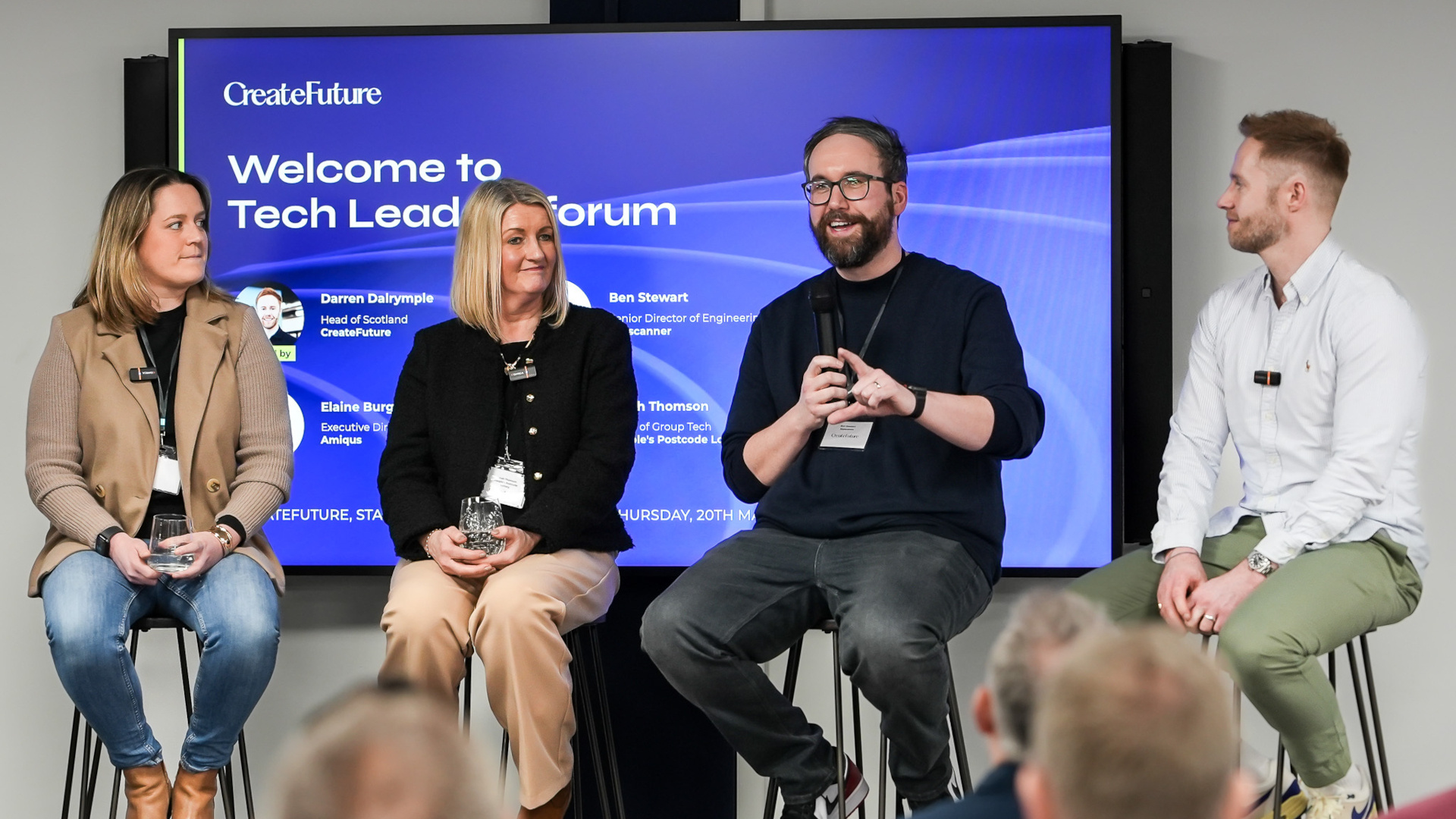If you’ve ever found yourself in a leadership role thinking, "I hope no one realises I’m just making this up as I go,” you’re in good company. Most leaders, as we recently discovered at our sixth Tech Leaders Forum, are figuring things out on the fly. Hosted by Darren Dalrymple, Head of Consumer Technology at CreateFuture, the forum brought together some of Scotland's most experienced tech leaders to talk about the messy, complex, and deeply human side of leadership in 2025.
The evening opened with a question about admired figures, with each panelist asked for their dream dinner guest, whether living or not. While some offered the usual suspects (such as Steve Jobs), others took a more unexpected route - particularly when selecting a ‘highbrow’ dinner guest.
Sarah Thomson, who leads Group Tech at People’s Postcode Lottery, chose Filipino journalist Maria Ressa for “spending her life being arrested trying to get the truth out there”. Ressa, a vocal critic of President Duterte and co-founder of news website Rappler, has been repeatedly targeted with legal charges and arrests for defending press freedom.
Ben Stewart, Senior Director of Engineering at Skyscanner, picked former footballer Ally McCoist and Glaswegian comic Kevin Bridges - mainly for the banter, imagining the two fast-talking Scots leaving poor Marcus Aurelius utterly baffled, “not understanding a single word they said.” His highbrow pick was the Roman emperor himself: “I’m quite interested in stoicism - I’ve read Meditations a few times.”
But as much as we might aspire to the calm wisdom of ancient philosophers, modern leadership often looks a lot messier.
The messy truth about leadership
The truth is, no-one really has leadership all figured out. As Tom Duke, CTO at Broker Insights, put it bluntly: “I have a lot of mistakes to choose from - and that’s even excluding the ones I’m never going to talk about in public.” His admission was far from unique. In fact, most of the panel agreed that making mistakes - and being honest about them - is a core part of leadership.
For Tom, one of the biggest challenges is getting so caught up in today’s problems that the bigger picture gets lost: “There’s a number of times in my career where I’ve done projects that I was incredibly proud of, and then I discovered I’d rearranged the deckchairs on the Titanic in a beautiful pattern.”
It’s a classic example of what happens when you focus so much on fixing problems that you forget to steer the ship. Leadership isn’t just about rearranging the deckchairs on a sinking ship; it’s about being the captain who sees the iceberg coming and has the guts to change course - a point echoed in The Journey of Leadership by Dana Maor, which highlights how effective leaders know when to step back, reflect, and make the hard decisions to pivot when necessary.
Struggling to be real
Being authentic as a leader is easier said than done. For Sarah, the challenge is resisting the urge to sugar-coat everything to appear like she has it all figured out. As she put it: “You want to be inspiring and motivational… but sometimes you just need to be real and say you’ve made mistakes. It gives people the confidence to be open about theirs.”
This theme of openness and vulnerability was echoed by Elaine Burgess, who serves as Executive Director at Amiqus. She noted that optimism bias - so often a strength in leaders - can lead to polishing ideas that no one actually wants. Her takeaway? "Done is better than perfect. But to get there, people need psychological safety."
Ben chipped in with a light-hearted but relevant example of communication gone wrong. He explained how cultural differences can lead to major misunderstandings: “I told a team I was really happy with how much they were 'knocking their pan in' [putting in a lot of effort]. They thought I was telling them to stop complaining. The ripple effect was… not great.”
It turned out to be a classic case of 'lost in translation’.
Finding shared solutions
Leadership can feel like a lonely journey, but it doesn’t have to be. As Darren pointed out, “It’s people that look like you, sound like you, and are going through the same challenges.” The panel was united on this: Finding your tribe and connecting with those who genuinely understand the pressures of leadership can make all the difference.
Elaine touched on this too, pointing out that leadership can become isolating if you don't create space for honest feedback. Others nodded along, recognising the importance of building peer networks where you can share the tough stuff without judgement. It’s about knowing you’re not the only one figuring it out as you go - and sometimes, just having a space to say it out loud makes all the difference.
Whether it’s through peer networks, moments of candid reflection, or a quick message of appreciation ("We have a tool at Skyscanner called High Five - you just send a thank you in Slack," said Ben), small actions make a big difference.
As Elaine said, “Looking after yourself isn’t just a nice-to-have. It’s a business imperative. If you’re not at your best, you’re a risk to your organisation.”
And if all else fails? Follow Tom's philosophy: “Don’t be a dick.”
The conversation was too valuable to keep within the room, so we captured it all on video. Click here to tune in.
